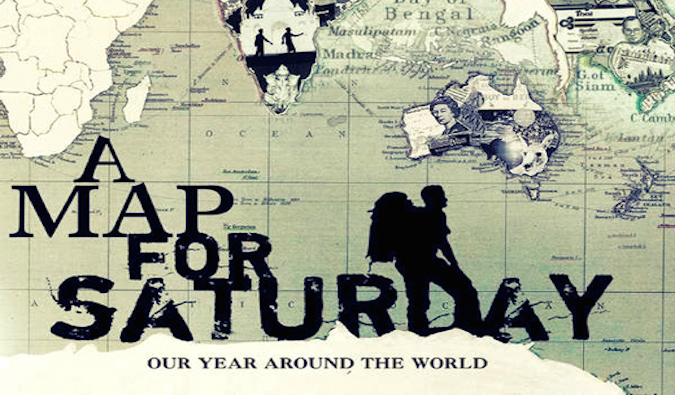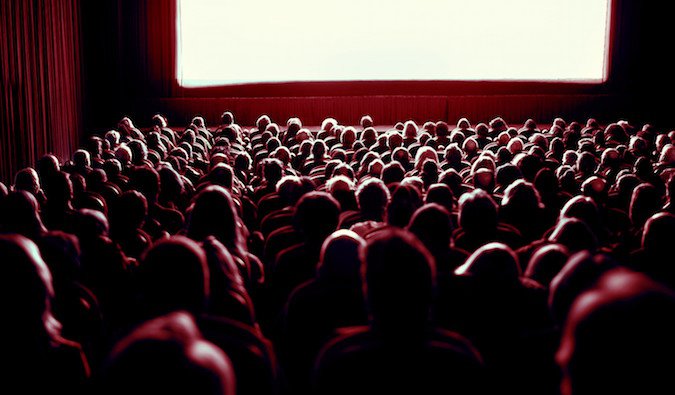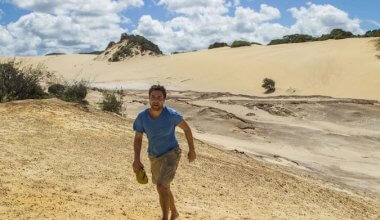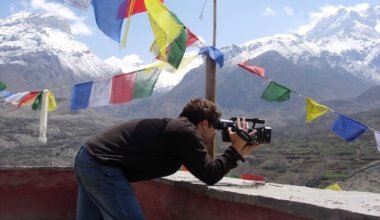
Updated: 02/16/19 | February 16th, 2019
I remember the first time I watched the movie A Map for Saturday. It was amazing. Utterly and totally amazing. The movie was recommended to me by a fellow traveler, and chronicles a man’s round-the-world trip back in 2005. It is filled with interviews from other backpackers and very accurately captures the highs and lows of travel.
Over a decade later, it’s still the most accurate movie about long-term travel.
For anyone who has ever backpacked or traveled for a long time, it’s an easy travel movie to relate to.
What I like the most about the movie is that it shows what life on the road is actuallylike, with all the ups and downs. The movie was filmed long before the age of social media, back when people had no real idea of what long-term travel was like. People assumed it was either some luxurious escapade or a grubby, dirty adventure where you slept in rat-infested hostels in far-flung corners of the globe.
A Map for Saturday shows what travel is actually like. No filters, no forced agenda. Just an honest look at budget travel.
That’s why I love it.
Check out the trailer:
The movie did such a good job of capturing the emotions of travel, from the tough goodbyes to culture shock to the fear of coming home.
Here are 7 things I think the movie did a great job of covering:
1. Instant friends
People always ask the same question of solo travelers: “Don’t you get lonely?” The truth is, you are never alone. On the road, you constantly meet people. You get into hostels, and you find instant friends. It’s as though you’ve known each other for years because you are each there for many of the same reasons. Moreover, you each fill a lonely void in the other’s life. And for that day, week, or month, you and your fellow travelers are best friends.
2. Why we do it
Why do we travel? Interviews with all the travelers in the film echoed a common theme – “We don’t want to look back and have regrets.” All these travelers felt that there was more to life than just the cubicle, and they could see the trajectory of their lives — wives, homes, children. There were no surprises. None of them wanted to be 50 and say “I wish…” The movie hit the nail on the head here. Sure, many people feel that way, but these travelers took the plunge. It’s hard to motivate yourself to travel, but they did. Why? Because we only live once, and no one wants to look back and say what if?
3. Turning into a lifelong traveler
Brook, the main character, says at the end of the movie that he took this trip to get travel “out of his system”. Then he’d come back, get a job, and live the life society wanted, but he found that instead of getting it out of his system, he just got more addicted to travel. Now he can’t go back to the way things were. He’s different. He can’t picture life without travel. When you talk to travelers, you hear the same thing: they are now travelers forever.
4. Saying goodbye
This is the hardest part about long-term travel, but the movie did a great job of showing what these goodbyes are like — and how emotional they can be. In the beginning, it is tough and you make promises to always stay in touch. But, as you travel, you get used to goodbyes. You say them every day and become numb to them after a while. Finally, you realize that while you shared perfect moments with your instant friends, you will never be able to recapture those moments, and you probably won’t see those friends again.
The advent of social networking sites has made it easier to stay in touch, but the reality is that we move away and move on to different lives. As Brook says, the longer he was home, the less frequently the e-mails came. I’ve always found it hard to say goodbye, but in the end, you realize that memory is the important part.
5. The “impending doom of home”
All good things must come to an end. As your trip comes to an end, all you can think of is, “I’m going home,” and it scares you. All you’ve known for a year or more is the traveling lifestyle. It becomes a way of life. Hostels, trains, buses, hassles, instant friends. Then as quickly as it started, it’s over. As one woman described it in the movie, there is a sense of impending doom and anxiety about going home. We want to go home, but deep down, we don’t. Maybe it’s because we realize there’s more to life than we knew before. I’m not sure, but whatever it may be, no one ever wants to go.
6. Burning out
After a while, you become numb to it all. “Ohh another waterfall?” “Another historic building?” After seeing so many beautiful things in the world, things lose their wonder. You should be impressed, but you’re not. You get sick of meeting new people and having the same conversations over and over again. Saying goodbye. Making promises to see each other. It was something I could relate to.
At the end of my first RTW trip, all I wanted to do was go home. I couldn’t be bothered to meet new people; I had already met so many. I was burnt out. After 18 months, I’d seen so much that being in Australia wasn’t exciting. It should have been, but it wasn’t. All travelers go through it, and I liked how Brook talked about it.
7. Being home
The hardest part of travel is coming home. It’s weird being back. Few people can relate to your experiences, and most don’t want to hear about them. The world stayed the same while you were gone, but you changed. And that’s the hardest part – realizing that nothing is different. You expect that life changed while you were away. A year is a long time, and then you come home and realize your world never moved forward. It was shocking to me.
In the movie, you hear from travelers about how once the honeymoon of catching up was over, all they wanted to do was get back out there. Home was suffocating. It feels as though you aren’t moving. After a week home, all I wanted to do was leave again. Being home is sometimes a lot harder than being away.
My only complaint about the movie is the video quality. When the movie came out, the quality was great. But video production has advanced in leaps and bounds since then and the video quality just feels a little dated (which you’ll notice if you watch the trailer below). Beyond that, I think it’s still the best travel movie out there.
If you want to understand why travelers do what they do and what it feels like to be out there, then watch A Map for Saturday. It’s as close as you can get to backpacking without leaving home!
Book Your Trip: Logistical Tips and Tricks
Book Your Flight
Find a cheap flight by using Skyscanner. It’s my favorite search engine because it searches websites and airlines around the globe so you always know no stone is being left unturned.
Book Your Accommodation
You can book your hostel with Hostelworld. If you want to stay somewhere other than a hostel, use Booking.com as it consistently returns the cheapest rates for guesthouses and hotels.
Don’t Forget Travel Insurance
Travel insurance will protect you against illness, injury, theft, and cancellations. It’s comprehensive protection in case anything goes wrong. I never go on a trip without it as I’ve had to use it many times in the past. My favorite companies that offer the best service and value are:
- SafetyWing (best for everyone)
- Insure My Trip (for those 70 and over)
- Medjet (for additional evacuation coverage)
Want to Travel for Free?
Travel credit cards allow you to earn points that can be redeemed for free flights and accommodation — all without any extra spending. Check out my guide to picking the right card and my current favorites to get started and see the latest best deals.
Need Help Finding Activities for Your Trip?
Get Your Guide is a huge online marketplace where you can find cool walking tours, fun excursions, skip-the-line tickets, private guides, and more.
Ready to Book Your Trip?
Check out my resource page for the best companies to use when you travel. I list all the ones I use when I travel. They are the best in class and you can’t go wrong using them on your trip.


